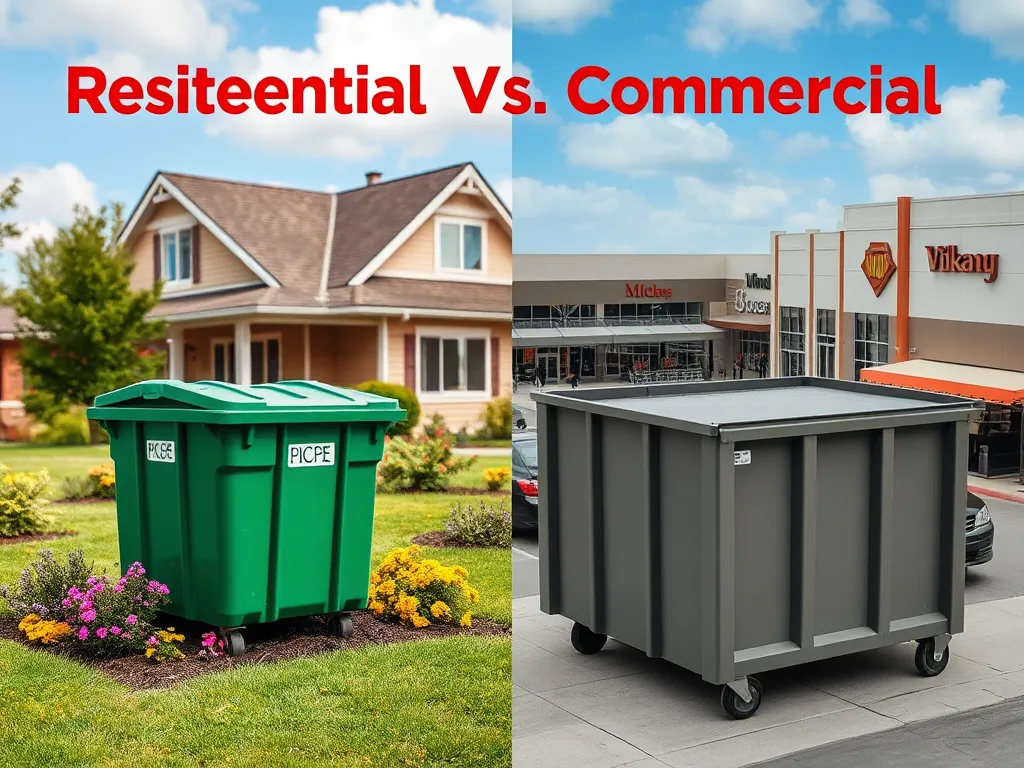Understanding Residential vs. Commercial Dumpsters: Key Differences

Residential vs. Commercial Dumpsters: Understanding the Key Differences
When it comes to waste management, the choice between residential and commercial dumpsters is a vital consideration for homeowners and businesses alike. Residential vs. commercial dumpsters serve different purposes, cater to various needs, and come with distinct features. This article will delve into what sets these dumpsters apart, helping you make an informed decision on which type suits your requirements best.
Understanding the various options available can help you choose the most suitable solution among the Different Kinds of Trash Bins for your needs.
A residential dumpster is designed primarily for home use. Typically rented for projects like cleanup, remodeling, or landscaping, they accommodate household waste more effectively. In contrast, commercial dumpsters are tailored for businesses, accommodating larger volumes of waste produced over time, particularly in high-traffic or industrial areas. Understanding the primary distinctions between residential vs. commercial dumpsters is crucial for selecting the right option for your waste disposal needs.
One major difference lies in the type and volume of waste each dumpster is equipped to handle. Residential dumpsters often contain debris from small projects, yard waste, or renovation materials, while commercial dumpsters are built to handle larger volumes of waste, including cardboard, packaging materials, and bulk refuse from restaurants, retail stores, or construction sites. Thus, the scale and nature of your waste directly influence your choice between residential vs. commercial dumpsters.
Another key factor in the residential vs. commercial dumpsters comparison is rental duration and costs. Residential dumpsters are generally rented for short-term use, usually ranging from a few days to a week, making them a more affordable option for temporary projects. Conversely, commercial dumpsters are often rented on a long-term basis, typically under contracts ranging from months to years, influencing the overall cost and commitment required for ongoing waste management solutions.
In conclusion, understanding the differences between residential vs. commercial dumpsters can aid in making the optimal choice for your waste disposal needs. Whether you’re a homeowner planning a renovation or a business operator looking for efficient waste management solutions, recognizing the distinction between these dumpster types is crucial for a successful project.
Types of Dumpsters
Residential dumpster options come in various sizes, typically ranging from 10 to 20 yards. Common uses include home renovations, yard cleanouts, and decluttering. These dumpsters are designed for the convenience of homeowners and are often placed in driveways or yards for easy access.
Commercial dumpster varieties include front-load and roll-off options. Front-load dumpsters are ideal for businesses with consistent waste needs, such as restaurants, while roll-off dumpsters are suitable for construction sites or large cleanout projects. These dumpsters come in sizes ranging from 2 to 40 yards, accommodating various waste volumes.
Roll-off dumpsters are open-top containers that can be easily transported to and from job sites, whereas front-load dumpsters are rectangular and typically contain a lid, designed for more frequent access and placement behind businesses. Each type serves specific purposes and environments, making the selection process vital depending on your waste generation patterns.
Cost Comparison
The average cost of residential dumpsters typically ranges from $300 to $600 for a week-long rental, depending on location, size, and type of debris. Additional fees may apply for exceeding weight limits or for disposal of prohibited materials.
Commercial dumpster pricing can vary significantly based on size and frequency of collection. Monthly fees for front-load dumpsters can range from $100 to $500, depending on the size and disposal frequency, while roll-off dumpsters are usually priced per rental period, which can range from $300 to $900 based on size and duration of use.
Factors influencing dumpster rental costs include the size of the dumpster, rental duration, location, and type of waste being disposed of. Understanding these elements can help you budget effectively and find the most cost-efficient option for your project, whether it’s residential or commercial.
Usage Scenarios
When to choose a residential dumpster is determined by the nature of the project. Ideal situations include home renovations, yard cleanups, or decluttering efforts. These projects usually generate a manageable volume of waste, making residential dumpsters the right fit.
Commercial dumpsters are ideal for ongoing waste needs in businesses like restaurants, shopping centers, or large office complexes. These settings require efficient waste management solutions to handle significant amounts of waste generated daily or weekly, necessitating the use of larger commercial dumpsters.
Projects suited for different types of dumpsters vary as well. Residential dumpsters are perfect for seasonal cleanouts or home improvement projects, while commercial dumpsters are suited for construction projects, large-scale events, or ongoing commercial waste disposal needs. Knowing the scope of your project can greatly influence which type of dumpster you should rent.
Size and Capacity
Common sizes for residential dumpsters range from 10 to 20 yards. A 10-yard dumpster is generally suitable for smaller projects like home cleanouts, while a 20-yard dumpster can accommodate moderate renovations or yard work.
Typical capacities of commercial dumpsters vary widely, with sizes from 2 to 40 yards. Smaller businesses might opt for 2 to 4-yard front-load dumpsters, while large construction sites or businesses generating significant waste may require 20 to 40-yard roll-off containers.
Choosing the right size for your project is critical. Underestimating the size may result in additional rental costs, while renting a too-large dumpster can lead to unnecessary expenses. Assessing your waste volume and type can help in selecting the appropriate size for both residential and commercial needs.
Regulations and Guidelines
Local regulations for residential dumpster use can vary greatly based on city or county rules. Some jurisdictions may require permits for placing a dumpster on public property, while others have restrictions on the types of waste that can be disposed of, reinforcing the importance of compliance with local laws.
Commercial dumpster permits and requirements typically include obtaining permissions for placement and ensuring frequent pickups due to the larger volume generated by businesses. Ensuring compliance with local regulations is vital for avoiding fines and maintaining a good relationship with waste management services.
Environmental guidelines for waste disposal apply to both residential and commercial dumpsters, urging users to separate recyclables, adhere to proper disposal methods for hazardous materials, and follow set guidelines to reduce landfill contributions. Familiarizing yourself with local environmental regulations is essential for responsible waste management.
